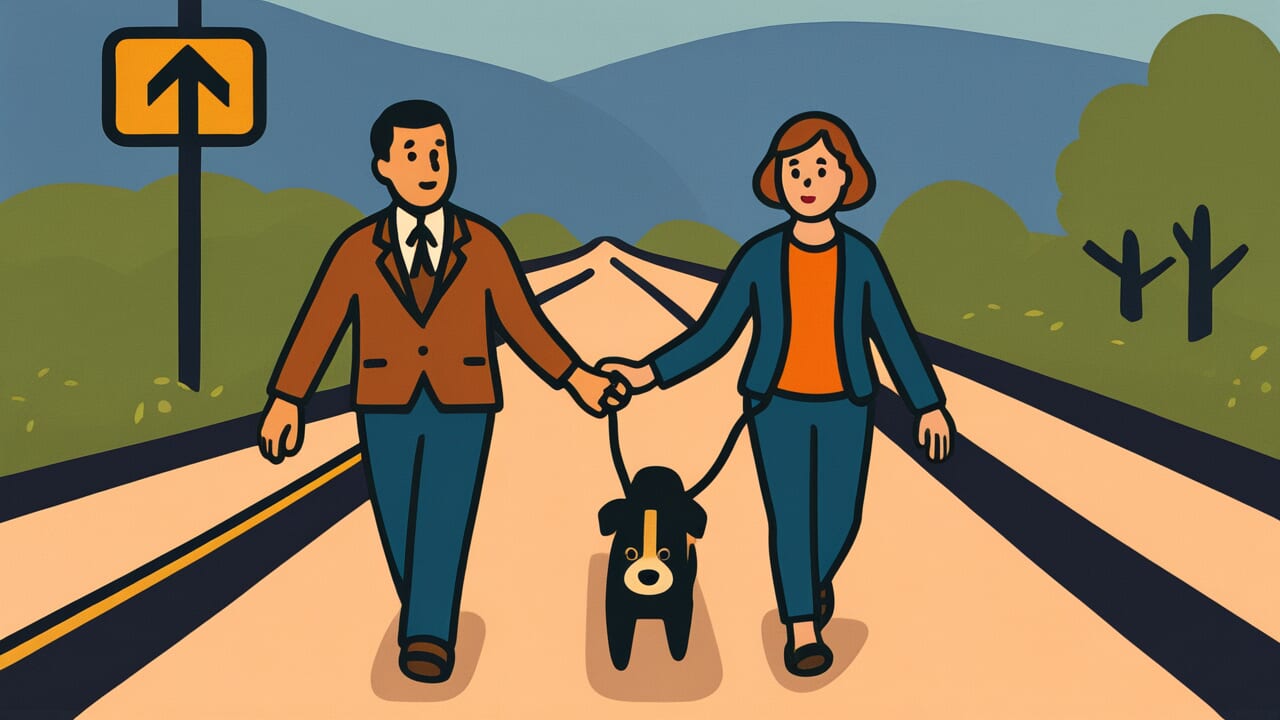How to Read “With a companion, I won’t take a three-mile detour”
Tsure ga areba sanri mawaran
Meaning of “With a companion, I won’t take a three-mile detour”
“With a companion, I won’t take a three-mile detour” means that when you have good company, even a longer route doesn’t feel burdensome. It expresses how human psychology works when we’re with people we enjoy being around.
Even a detour you’d normally avoid becomes pleasant when you walk it with compatible companions.
This proverb shows a value system where who you spend time with matters more than reaching your destination quickly. It applies to situations like traveling with friends or working together on projects.
In these moments, people prioritize human connection over efficiency. Even if the route is longer, you can enjoy conversation and create memories with your companions.
The proverb teaches us that this shared time holds the real value.
Even today, we see this spirit alive in students taking detours home with friends or coworkers choosing longer routes together. People instinctively understand the richness of human connection that efficiency alone cannot measure.
Origin and Etymology
The exact first appearance of this proverb in literature is unclear. However, based on its structure, scholars believe it emerged among common people during or after the Edo period.
“Sanri” (three ri) equals about 12 kilometers. For people of that era, this was not a short distance at all.
When walking was the main form of transportation, a three-ri detour required considerable time and physical effort. It was a significant choice to make.
What’s interesting is how this proverb positively views the seemingly inefficient act of taking a detour. While choosing the shortest distance is considered rational, why would anyone deliberately choose a longer route?
The answer lies in the value of “tsure” (companion). Being with companions is worth more than the loss of time or distance.
This expresses a fundamental human emotion.
In an era when travel involved danger, traveling with companions was important for safety. However, this proverb goes beyond such practical reasons.
It speaks to the joy of being with others for its own sake. Conversations along the way, shared scenery, time spent together—Japanese people have long treasured these invisible values.
Behind these words lives a cultural value system that honors human bonds over efficiency.
Usage Examples
- Today was a case of “with a companion, I won’t take a three-mile detour”—I took the long way home with my friend and had a great time
- When I’m with her, it’s truly “with a companion, I won’t take a three-mile detour”—no journey feels difficult
Universal Wisdom
The proverb “With a companion, I won’t take a three-mile detour” speaks to a universal truth. Some things matter more to humans than efficiency or rationality.
Why do people sometimes make inefficient choices? Because humans are fundamentally social creatures.
We find true fulfillment through connections with others.
This proverb has been passed down through generations because it captures a fundamental human need. We fear loneliness, seek empathy, and feel deep joy in sharing experiences with someone.
Reaching your destination quickly is certainly convenient. But the time shared along the way—the dialogue, laughter, and even silence—holds irreplaceable value.
Modern society emphasizes efficiency, and choosing the shortest route seems natural. Yet the human heart, unchanged from centuries ago, still seeks the warmth of being with others.
Life’s richness often hides in time that appears wasted, like taking detours. Our ancestors understood this deeply.
This proverb continues to convey, in simple words, the value of human relationships that speed and efficiency cannot measure.
When AI Hears This
When walking alone, we choose the shortest route to our destination. But with a companion, we suddenly decide “let’s stop at that shop” or “let’s take the scenic route.”
This isn’t mere whimsy. Two psychological mechanisms work simultaneously.
First, consider the perspective of transaction utility. In behavioral economics, the practical value of something is called “acquisition utility,” while the sense of getting a deal or something special is “transaction utility.”
Alone, travel is just a means. But with a companion, it gains added value as “time spent together.”
Even with a three-ri detour, that time generates transaction utility as a “shared experience.” The brain judges “this isn’t a loss.”
The same three ri becomes an investment with a companion, rather than pure cost when alone.
The sunk cost effect adds another layer. You made arrangements to meet, adjusted schedules to be together. This “already invested effort” feels wasteful to abandon.
Parting ways quickly seems regrettable. So the brain starts seeking reasons to justify the detour with “since we’re already here.”
What’s fascinating is that when this double bias operates, subjective satisfaction increases even though the choice is objectively inefficient. Human decision-making holds complexity that efficiency alone cannot measure.
Lessons for Today
This proverb teaches us a fundamental answer about what we should prioritize in life. Do you chase efficiency every day?
Choosing the shortest route, saving time, eliminating waste—these are certainly important. But you might be losing something in the process.
In modern society, we can complete more things alone. We shop online, eat alone, and communicate through screens.
While life has become convenient, opportunities to actually share time with people have decreased. This proverb carries a message we need to reconsider, especially now.
Time spent with important people is never wasted. Routes that seem like detours often turn out to be the richest times when we look back.
Stopping places with friends, walks with family, slow journeys home with coworkers—these casual moments add color to life.
This proverb gives us courage to choose a life walking with important people, rather than a life pursuing only efficiency.



Comments